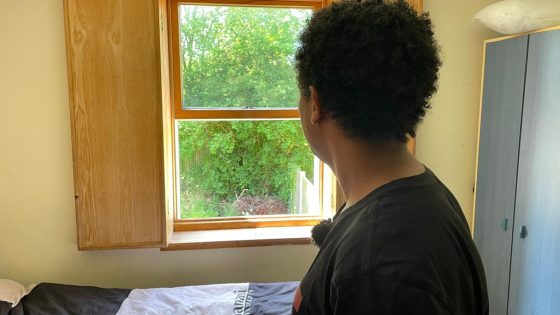In June 2022, Kidus, 30, from Eritrea, came to the UK in a small boat with around two dozen other people.
He still has the video on his phone showing everyone – including some women and children – clinging on to the dinghy wearing identical red lifejackets.
Back then, the government had already announced plans to send asylum seekers to Rwanda.
Despite being sent a letter warning he’s being considered for removal, he’s never thought it could really happen until now.
Kidus – not his real name – says before he left France, one of the people smugglers reassured him the government wouldn’t go through with it: the Rwanda policy simply wouldn’t affect him.
But earlier this month, one of his friends from Eritrea, who was on the same boat across the Channel, was detained when attending a routine appointment with the Home Office at a site in Liverpool.
As a result, Kidus is now considering not going to his next fortnightly meeting, even though attending the appointments is a condition of his immigration bail.
“If I didn’t go there, I know they’ll drop my case,” he tells us, concerned his asylum application will be cancelled.
But he adds: “If I go I know they will detain me. So, I’m just confused what I’m going to do.”
A document drawn up by Home Office officials revealed only 2,143 of the 5,700 asylum seekers Rwanda has agreed to accept actually attend check-ins and “can be located for detention”.
If people like Kidus stop attending, they will join the remaining 3,557 migrants who are currently missing.
The shared house Kidus lives in is paid for by the Home Office – so his address makes it almost impossible to disappear. But this means he knows he could be detained at any time.
“I’m always just frightened here. So, they might come at night or day and I’m always thinking that they’ll come and they’ll take me to detention. I’m not feeling safe here,” he says.
Kidus has stopped attending college where he was learning English and carries the phone numbers of legal firms with him at all times.
He speaks to his friend on the phone – who is now being held in a detention centre near Heathrow.
Nahom, not his real name, 26, estimates he’s among around 40 asylum seekers there who’ve been told they’ll be sent to Rwanda.
“It’s like a nightmare, it’s like a prison and I don’t like it here. I’m really stressed and panicked about the situation,” Nahom tells us from the site almost 100 miles away.
He admits he has been able to meet his solicitor but says he’s feeling increasingly desperate about being faced with the prospect of being sent to Rwanda.
“They can send my body, but not me alive,” he says. “I’m just giving up.”
In west London, we meet Nura, in her 20s, whose real name is withheld and who has made the decision to keep attending meetings with the Home Office because she doesn’t want to be kicked out of her taxpayer-funded hotel.
Read more:
Sunak’s Rwanda plan is at risk of being undermined
UK considered Iraq for asylum seekers in Rwanda-type deal
But each time she goes to sign in she’s terrified of being detained.
“Sometimes I say ‘why me’?” she asks tearfully, looking at her “notice of intent” letter warning her she’s being considered for removal to Rwanda.
“It’s not a safe country,” she adds. “What is the difference from Eritrea? It’s the same.”
Nura says when she came to the UK by small boat, she believed women wouldn’t be sent to Rwanda. She says she wouldn’t have come if she’d known she was at risk.
Kidus says the same thing: “If I’d have known this I’d have never come here.” He added he’d have instead gone to “Belgium or France, or Germany maybe”.
Now they’re here, their only hope is they won’t be chosen for detention.
The government remains determined to get the first flights to Rwanda within weeks.
Ahead of a general election, the plan has become a clear dividing line between the Conservatives and Labour, which has vowed to scrap the scheme if it comes to power.
Source Agencies






